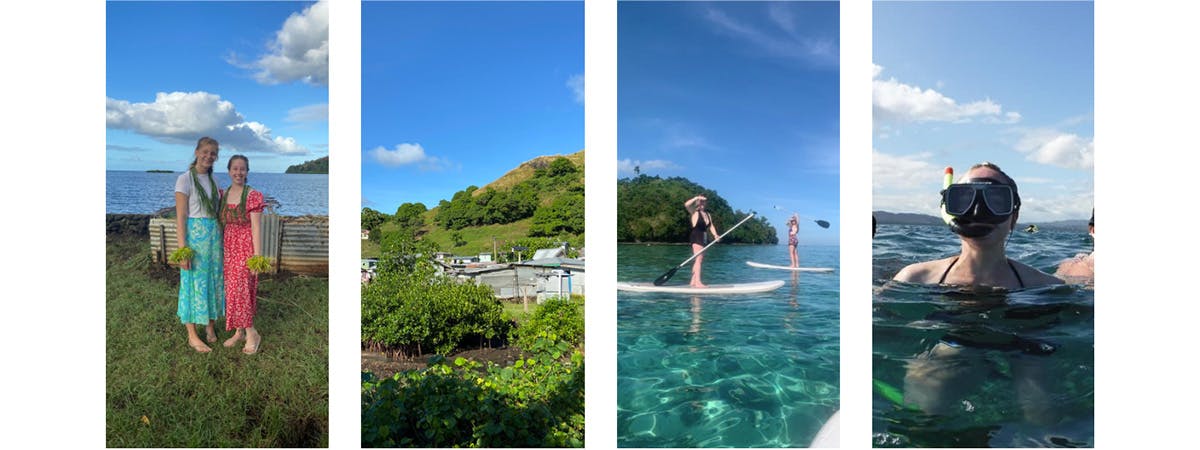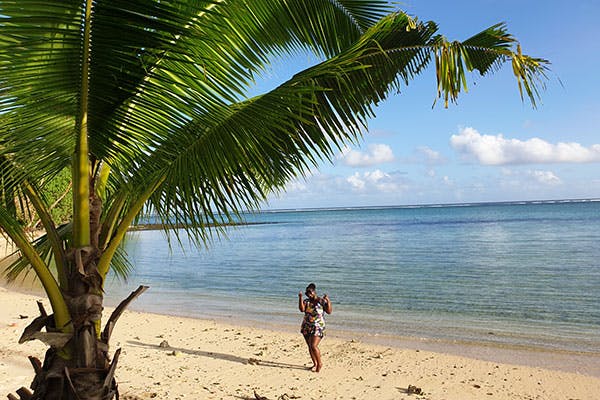Georgia spent her summer in Fiji, volunteering as part of a team facilitating a mental health project. Georgia developed her mental health awareness and her knowledge of a new culture.

"From June to July 2022, I travelled to Fiji to volunteer with Think Pacific to facilitate the delivery of a mental health project. I was incredibly nervous until I landed in Fiji, then the excitement kicked in.
I flew a few days early as I wanted to explore the island and go on a few adventures, which included swimming with black tip reef sharks, turtles, jellyfish, clownfish, and blue starfish. It was such an amazing experience that I was able to tick off my bucket list!
We spent six days at a resort attending workshops on Fijian culture, mental health in Fiji and being briefed on what our project would involve, as well as bonding as a group.
The day we left for the village, I was very nervous, as it was a completely new experience. We didn’t know much about the village; only that it was called Nayavutoka, was on the north-eastern side of the island and was badly affected in 2018 by Cyclone Winston. It was a very long, bumpy drive to the village, but we played some music and were all up dancing to help pass the six-hour coach journey!
When we arrived in Nayavutoka, we were greeted with open arms. We headed straight into the community hall for the Sevu Sevu, a greeting ceremony welcoming and accepting us into the village. During this time, we met our Fijian parents who presented each of us with a beautiful flower garland before showing us to their homes.
My house was made of tin sheets nailed to a wooden frame and was essentially one room divided into a main living area and two small bedrooms. One thing I discovered very quickly was that Fijians are possibly the nicest people on earth! The families were all very poor, living off the food they had caught or grown, however, they would give you everything they had to make you comfortable – including their own beds!
Our Fijian parents insisted on sleeping on the floor, so my project sister and I could have their bed, despite my Ma being seven months pregnant! After a brief introduction with our families, we headed for a group welcome dinner which consisted of a whole fish in a bowl for each of us and some cassava on the side. Later in the evening, we found our way back to the community hall for a welcome celebration and to drink Kava. The whole village joined in with the celebrations and everyone was singing and dancing – it was a really lovely, heart-warming experience.
We soon began running the sessions alongside another organisation called Youth Champs 4 Mental Health. Our days were structured, so we would assist with the project in the morning focusing on topics such as mental health vs mental illness, stigma, where to go for support and a big focus on suicide awareness and prevention. In the afternoon, we’d attend a culture session led by young Fijian in the village, where we learned skills such as fan weaving, Billy Billy making, visiting the farm and learning the Meke – a traditional Fijian dance.
Every Saturday, we had a free day to do activities such as boat trips to a remote beach, watching the village rugby team play a tournament against a neighbouring village, and hiking up the mountains that surround the village. The village is very religious, so we attended church every Sunday and would then relax. To keep ourselves entertained, we played a lot of card games, made friendship bracelets and swam in the river surrounding the village. One of my favourite memories was teaching the young people to play rounders, which they loved, and we ended up playing for hours until it got dark.
One thing I was not prepared for was the number of animals and how noisy the village was. I expected it to be peaceful, and it was to an extent, however, I averaged about five hours of sleep a night. This was due to my little sister crying in the night, my Ta, the village Pastor, banging the Lali at 4am every morning to wake people up for devotion, and animals such as dogs and roosters. On top of that, we frequently had chickens wander into our bedrooms and lay eggs in our bags and clothes!
It was winter, so although it was incredibly hot, it got dark early in the evenings around 6pm, so we had to use torches to navigate the village. As soon as the sun started to set, an abundance of frogs would appear, and it was a nightmare trying to walk anywhere without them jumping out at you. They made us jump so many times, but it was always a good laugh!
One Sunday during the project, the village hosted a Soli Soli, a fundraising day to help raise money for the church, which had been destroyed in the cyclone. Our lunch was cooked in a Lovo, an underground oven used for special occasions, and we performed the Meke for the visitors in the village. It was a really lovely day where people from all over Fiji visited, we drank plenty of Kava, sang, and danced until it was gone midnight!
My time in the village flew by and it was soon time to leave. Our last day was spent visiting the preschool where we knew all the children, as they spent most of their free time braiding our hair and chilling with our family.
We also performed the Meke one last time before having a leaving party with everyone in the village, including drinking lots of Kava, eating Fijian sweets, singing and dancing. It was a really lovely but emotional night as Nayavutoka had quickly become our home.
The morning of our departure arrived, and our Ta helped us take our bags to the bus. We had an emotional goodbye with our family including our very mischievous little sister and our Ma made us the most beautiful garland I have ever seen, including our favourite flowers picked from trees around the village. She also told us that they would be naming their baby after myself and my project sister, which was really touching to hear and made it even harder to leave. There was not a dry eye in the village as we drove off and it was a very quiet drive to the resort where we were debriefed.
I have learnt so many things about mental health in different cultures, how far behind many countries are in terms of mental health awareness, and how important organisations such as Think Pacific are to help educate people. Before I arrived in the village, I was sheltered and never really grasped how different other cultures are to what I have grown up with. After less than three weeks in Nayavutoka, the experience taught me to appreciate everything I have such as a roof over my head, running water, electricity and nutritious food – even fresh fish with its head attached.
I can wholeheartedly say that my time in Fiji has changed my outlook on life and has changed me for the better! I’ll forever be grateful for the experience of living in Fiji and to be able to call it my home. I miss my Fijian family tremendously and cannot wait to return so I can visit them!"
